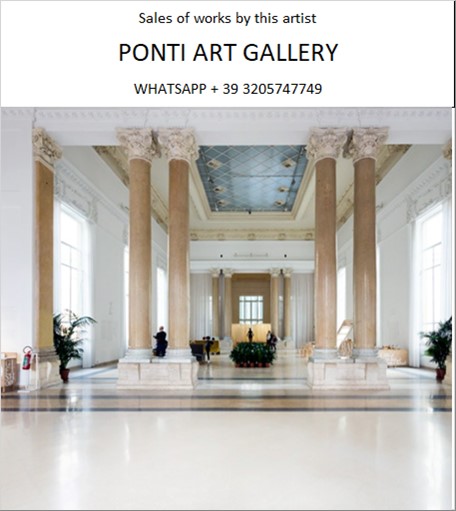Ponti Art Gallery is interested in buying and selling works
of art by this artist.

Leon Ferrari Biography
León Ferrari, born on September 3, 1920, in Buenos Aires, Argentina, was a figure of monumental significance in the realm of contemporary conceptual art. His life, marked by a fervent dedication to challenging societal norms and institutional violence, spanned over nine decades, during which he developed a multifaceted artistic oeuvre that defied easy categorization. Ferrari's work, deeply imbued with a critique of power structures, particularly those upheld by the state, the church, and the military, remains a testament to his unwavering commitment to social justice and human rights.
Ferrari's early life was shaped by his education in engineering, which he pursued at the University of Buenos Aires. Despite this technical training, his artistic inclinations were evident from a young age, influenced in part by his father, Augusto César Ferrari, a well-known painter from San Possidonio, Italy. This blend of scientific rigor and creative exploration would come to define Ferrari's unique approach to art, characterized by an experimental spirit and a relentless inquiry into the mechanisms of oppression and control.
In the 1950s, Ferrari's artistic journey took a decisive turn when he moved to Italy with his family, seeking treatment for his daughter's tuberculosis. It was during this period that he began working with clay, marking the beginning of his engagement with the visual arts. Upon returning to Buenos Aires in 1955, Ferrari expanded his practice to include sculpture, utilizing materials such as wood, plaster, and cement. His early works were primarily abstract, but by the 1960s, Ferrari's art took a decidedly political turn, reflecting his growing concern with the social and political upheavals of his time.
Ferrari's art from this period is characterized by its use of collage, photocopying, and sculpture to critique the Argentine government, the imperialist West, and the Catholic Church. His most controversial work, "Western and Christian Civilization" (1965), which depicted Christ crucified on an American fighter jet, exemplified his ability to provoke public debate and challenge the status quo. This piece, along with others that employed religious iconography to critique power and violence, earned Ferrari both acclaim and censure, including from Pope Francis, then Cardinal Jorge Bergoglio, who condemned Ferrari's work as blasphemous.
The 1976 military coup in Argentina forced Ferrari into exile in Brazil, where he continued to develop his artistic practice, exploring new mediums and themes. During this period, Ferrari engaged with the local experimental art scene, collaborating with artists such as Mira Schendel and deepening his critique of authoritarianism and religious dogma. His work from this time includes the "Paraheretics and Xerox Series," which used photocopies to juxtapose Renaissance art with contemporary images, further exploring the intersections of art, religion, and violence.
Ferrari's return to Argentina in the 1990s marked a new phase in his career, during which he focused on memory, truth, and justice, particularly concerning the victims of the military dictatorship. His commitment to human rights was reflected in his involvement with movements such as HIJOS, which sought to locate and bring to justice those responsible for the disappearances and killings during the dictatorship.
Throughout his life, Ferrari received numerous accolades for his work, including the Golden Lion Award at the 2007 Venice Biennale. His art has been exhibited in major institutions worldwide, such as the Museum of Modern Art in New York, the Tate Modern in London, and the Museo de Arte Latinoamericano de Buenos Aires. Ferrari's legacy as an artist and activist continues to inspire new generations, challenging them to question the narratives of power and to imagine a more just world.
León Ferrari passed away on July 25, 2013, in Buenos Aires, leaving behind a body of work that remains as relevant and provocative as ever. His art, characterized by its amiable cruelty and implacable contestation of religion and authoritarianism, stands as a powerful reminder of the role of the artist as a social critic and a defender of human dignity.
Leon Ferrari Quotes and Sales
of Works
Ponti Art Gallery selects and deals with paintings by the
artist. Upon request, we provide free estimates and
evaluations, communicate prices, quotations, and current
market values.
If you are interested in BUYING or SELLING works by the
artist, contact us immediately.
If you wish to sell or receive an evaluation of the
works:
Send us a frontal photo of the painting, one of the back,
and one of the signature. Also, indicate the dimensions of
the work. Inform us about the purchase origin of the work
and any kind of available documentation (purchase
receipts, certificates of authenticity, publications). One
of our operators will respond to you on the same day. We
guarantee maximum confidentiality and extreme
professionalism.
If you wish to purchase works by the painter: Contact us
and let us know your request. We will inform you about the
available works. We also offer the possibility to
subscribe to our NEWSLETTER, through which you will be
informed at the beginning of each month about the latest
acquisitions of the art gallery.
You can send us pictures of the work:
